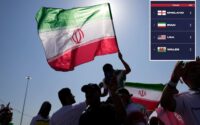‘El Presidente’ on Amazon: A Story That Combines Ruthless Ambition and Ritual Abuse of Power
The last time that FIFA was given the scripted drama treatment, we ended up with the kind of shameless self-hagiography that would even make Kim Jong-un think, “This is a bit much, no?” 2015’s United Passions presented the soccer world’s governing body as a picture of virtuosity, but in a karmic case of bad timing, trickled into cinemas just a week after it became engulfed in the sport’s biggest ever corruption scandal.
You certainly can’t accuse Amazon’s first Chilean original of ignoring such grubby, glaringly obvious wrongdoings. The Spanish-language El Presidente pores over all the bribery, fraud and money laundering in such meticulous detail that you may require a degree in financial crime to keep up.
The globe-trotting dramedy may tackle FIFA’s antics from an entirely different perspective to its Razzie-winning predecessor. But it still shares a similar problem: boardroom administration, no matter how nefarious, is difficult to make compelling.
Director Armando Bó, the Oscar-winning screenwriter of Birdman or (The Unexpected Virtue of Ignorance), tries his best to hold the attention. Each major player is given the type of freeze-frame introduction you’d expect from a Hollywood heist movie. There’s a glut of snappy montages set to the summery sounds of traditional Latin pop. And the ghost of Argentinian FA president Julio Grondona (Luis Margani), the man blamed by FIFA for instigating the whole mess, pops up throughout to offer some meta observations about all the wheelings and dealings.
The latter’s FIFA-for-beginners pieces to camera are often eye-opening (“Bomb my country if you want but don’t leave it out of the World Cup,” he explains about the mentality of the average soccer association president”). Unfortunately, they’re also more engaging than the central storyline and, indeed, its central figure Sergio Jadue (Andrés Parra), a curious man initially dubbed the least influential president in soccer history but one who was ultimately influential in exposing its corrupt heart.
Jadue began his sporting career guiding (well, as he’d have you believe) the little-known Unión La Calera to their first promotion in 26 years before being fast-tracked to the presidency of Chilean soccer’s organizational body, the ANFP. The former law student is seen here being voted in simply to take the fall for getting rid of beloved national coach Marcelo Bielsa – one official slyly refers to Jadue as a “yoghurt president” due to his impending expiration date.
But thanks to a combination of ruthless ambition, abuse of power and the cunning of his Machiavellian wife Nené (Paulina Gaitán), Jadue ends up ascending the ranks of the South American game. By the time he’s rubbing shoulders with Sepp Blatter, he’s also been coerced into acting as an FBI informant tasked with bringing down the FIFA men who’ve lined their pockets with $150 million in backhand deals.
No stranger to real life figures having previously portrayed notorious drug kingpin Pablo Escobar (El Señor de los Cielos) and Venezuelan president Hugo Chávez (El Comandante), Parra nails Jadue’s whiney voice and inherently weasely demeanor. But he’s lumbered with a charisma vacuum of a character who’s too unsympathetic to root for – we first see him threatening to beat up the underperforming local team whose wages he hasn’t paid – but not quite heinous enough to root against.
How to Get Away with Murder‘s Karla Souza, who plays bilingual FBI agent Rosario, also gets a raw deal. There’s the soapy melodrama involving a dying relative and a double-crossing colleague she mixes business and pleasure with. And despite being pivotal to the whole operation, her character spends much of her time in a state of undress.
You can perhaps understand why Bó may have felt the need to sex things up a bit. Making such dry subject matter entertaining over the course of a feature-length movie is doable: see how Adam McKay handled the 2007-08 global financial crisis in The Big Short, for example, or how Bennett Miller had us all gripped by baseball statistics in Moneyball. But sustaining such momentum across eight hour-long episodes is another thing entirely.
Had El Presidente condensed its more inspired moments – the surreal costume party where a vital FIFA appointment is announced by a committee member in a lion suit, an ill-fated chase sequence, whenever Jadue’s scene-stealing media consultant launches into a foul-mouthed tirade – into a similar-length feature film, then its exploration of FIFA-gate would undoubtedly have been a more palatable watch.
Instead, whenever the action finally starts to get going, the show hits the pause button for a pointless flashback or fantasy sequence. In fact, El Presidente‘s confusing narrative structure travels back and forth so often it could induce whiplash, and the final episode is essentially just one long curtain pull which reveals that half of its key characters and plot strands are entirely the work of fiction.
“Wow, this is longer than a Siberian winter,” moans one of the dodgy FIFA officials during some particularly torturous negotiations. He could just as easily be describing the show he’s in.
JonO’Brien(@jonobrien81) is a freelance entertainment and sports writer from the North West of England. His work has appeared in the likes of Esquire, Billboard, Paste, i-D, The Guardian, Vinyl Me Please and Allmusic.


